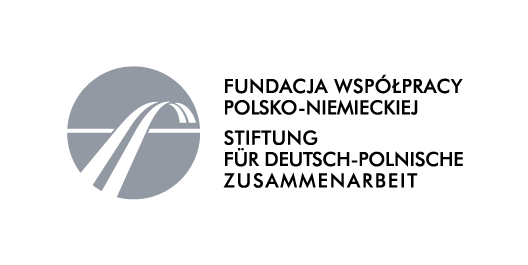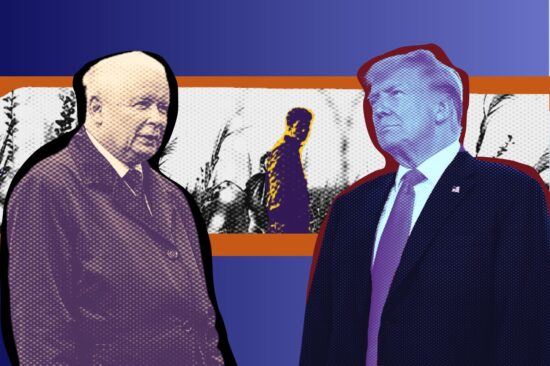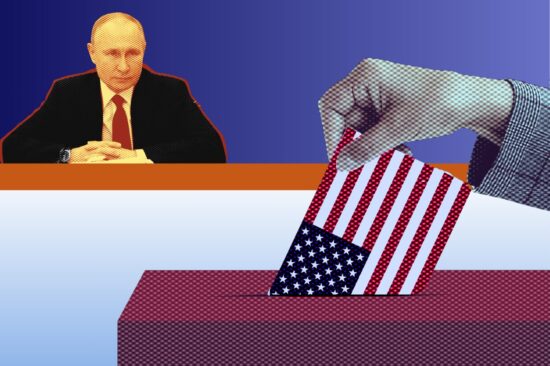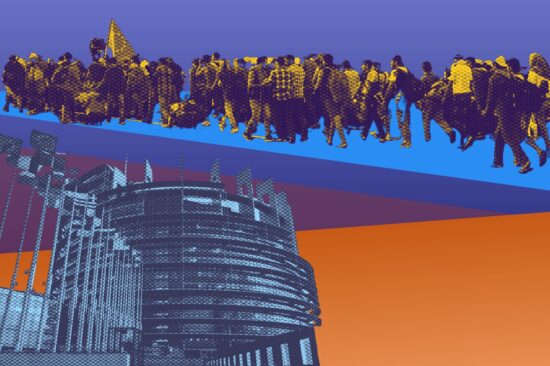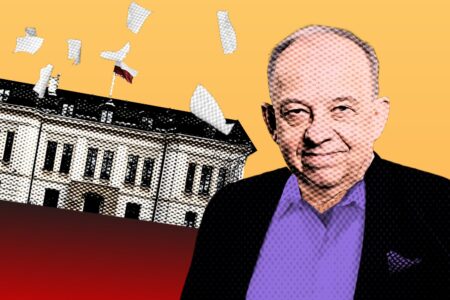[ Wersja polska / deutsche Version / English version ]
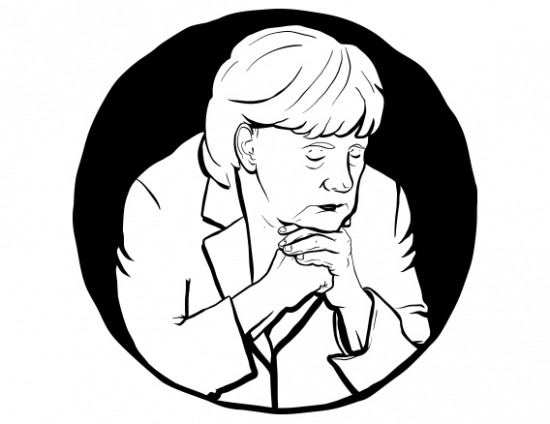
Dear Readers,
Is it possible for the elections to the Bundestag to be more important than those to the European Parliament? It seems quite true, indeed: hardly anything over the last few weeks has caused quite as much excitement among international commentators as the result of the upcoming Sunday ballot in the Federal Republic. This is not surprising. The state was referred to as “the sick man of Europe” by Katinka Barysch (Centre for European Reform)only a decade ago. Many thought that it “would not be easy to save”, as implied by Hans-Werner Sinn, one of the best known German economists. But today, it is looked at with a dose of admiration and jealousy. Since the euro zone crisis started, the German economy has ever more frequently been called a role-model for Europe, with particular emphasis on the 2003–2006 reforms by Gerhard Schroeder’s administration. Suffice to mention the memorable title of last year’s feature by „The Economist”: „Modell Deutschland über alles”
This atmosphere means that Europe is pinning its hopes on Germany. Hoping, to quote the words of Timothy Garton Ash, that this most powerful country of the Old Continent will not only lead the way in building both a sustainable, internationally competitive Eurozone, but also a strong, internationally credible European Union. Such expectations have even been voiced by Polish politicians like Radosław Sikorski in his address in Berlin in 2011.
A lot seems to indicate that these great hopes might be in vain. Why? Some of our contemporary authors believe that all this will prove impossible to achieve for Angela Merkel, even if – which seems quite probable- she manages to win her third term as the Chancellor. Judy Dempsey seems to subscribe to the view that Germany’s reluctance to exert leadership in Europe – apart from the euro crisis – might be attributable to the Merkel’s particular style as a leader. She claims this style can be seen in the way Madame Chancellor sidesteps key areas of politics such as security and defense. Still, would a change of leadership in the Federal Republic bring about a real change, with a less conservative and a more visionary attitude to politics?
There aren‘t too many reasons to believe so. First of all, as it has been recently pointed out by Ulrike Guérot from the European Council on Foreign Relations, Germany is being blocked by its own problems, ranging from the growing poverty in what is now a dramatically increasing group of the elderly, to the overwhelming inequalities in income. Let us remember that these are the exact problems that lie at the centre of the pre-election debate, which has caused criticism of the allegedly boring campaign.
Second of all, from a more sociological point of view, one could say (and both Piotr Buras and Claus Leggewie are inclined to think so) that Germans are not ready for radical changes. According to Buras, there is no point considering whether or not the common evaluation of Merkel as a post-political and Teflon politician is a fair one. It is no coincidence that a person of such character enjoys record breaking popularity. The Germans themselves are not yet ready to take a turn in a few major areas of politics. Leggewie shares this opinion. And it is a pity, because as he says, even if “vision is an overstatement”, coalitions different than the current one, are possible in the Federal Republic. Coalitions that could lead to the creation of a sustainable energy policy in Europe; an important issue both for the integration, and for a possible resurgence in the South. Leggewie is eager to criticise the Polish government on that issue.
Could the European Union be saved by an energy policy inspired by Energiewende? Despite all the benefits it entails (which we reviewed in our issue „Liberty, climate, electricity!”), this is, however, highly doubtful. One might also have certain doubts as to whether focusing exclusively on the Federal Republic and its willingness, or unwillingness, to assume leadership is good for the Community. This seems to be the spirit of Marek Prawda’s standpoint. The quicker we go back to business as usual, the better, suggests Prawda. The first positive effect of the elections, according to him, will be the end of a number of futile disputes. This will allow us to go back to the most important issues of the European debate. And as for the sentiments of the voters – this nation will stand the real test of resilience a lot later, when Berlin will be forced to face the possible restructuring of the debt of countries included in aid programmes, i.e. incur actual expenses rather than just granting loans.
This issue closes with two articles providing a further analysis and a slightly wider context to the discussion on the role of Germany in Europe. The debate concerning Germany’s leadership has revealed some underlying resentment felt by Europeans. This is symbolically represented by the images of Angela Merkel wearing an SS uniform which have appeared in the internet, the press and during demonstrations. These were shocking images even in Berlin. Jarosław Kuisz emphasises that in times of crisis and recurring resentments, it is time to go back to thinking about historical education. He reminds us about it when cuts in education are being made throughout Europe (Germany itself introduced such austerity measures during the aforementioned Schroeder’s reforms). Małgorzara Ławrowska reflects on the German institutions which debate on democracy. Angela Merkel’s pendant was the main focus of social media’s attention during the debate between the current Chancellor and Peer Steinbrück. What does it tell us about institutions of a debate? Are they strong enough to survive the crisis? And where do we look for them, apart from the internet?
***
This week’s feature is another one in the series prepared by the Foundation of Polish-German Cooperation and “Kultura Liberalna” within the Polish-German project on the future of the European Union.
Published so far: „Should Germany make a sacrifice for the European Union?” with essays by Ivan Krastev, Clyde Prestowitz, Karolina Wigura and Gertrud Höhler; „Europe is a humiliated empires’ club”, the only interview with Peterem Sloterdijkiem published in Polish press over the last few years; „A dream of a welfare state” with essays by Wolfgang Streeck, Richard Sennett, Jacek Saryusz-Wolski and Łukasz Pawłowski, „Liberty, climate, electricity!” with essays by Claudia Kemfert, Wojciech Jakóbik, Grzegorz Wiśniewski i Jakub Patočka and „Discriminated, unwanted, invisible? Aliens in 21st century Europe” with essays by Necla Kelek, Saskia Sassen, András L. Papa and Katarzyna Kubin. New issues soon!
We hope you will enjoy your reading!
Karolina Wigura
1. JUDY DEMPSEY: The reluctant leader
2. CLAUS LEGGEWIE: Merkel’s policies show a paralysing presentism
3. PIOTR BURAS: The Merkel Era and what next?
4. MAREK PRAWDA: A pedagogy of crisis
5. JAROSŁAW KUISZ: Finance and remembrance
6. MAŁGORZATA ŁAWROWSKA: Pre-election Crosstalk
The reluctant leader
Faced with the Euro crisis, it was Angela Merkel that has set the policy for Europe. It is still too early to say if the austerity policies she has insisted upon for highly indebted countries will work. But at least in this area, she has accepted a leadership role. However, leadership is sorely needed in foreign and security policy, too. Europe needs to think and act strategically in order to help stabilize and democratize its eastern and southern neighborhoods. The same goes for building a new transatlantic relationship.
Under Merkel, Germany has shied away from providing leadership in that area. Indeed, of all the more recent German chancellors, Merkel is probably the one with the least interest in defense and security policy. While she is known to devour files on just about any other political issue, she has always been happy to leave military matters to the experts. Perhaps this lack of commitment is due to her East German upbringing; or the fact that her father was a pastor; or her own education as a scientist. Whatever the cause – Merkel has, ever since taking office in 2005, kept a very low profile on defense or security policy.
Discouraging as the security strategy for Europe
One topic she has avoided in particular is the role of drones, whether for combat or surveillance purposes. Her refusal to address this issue became obvious this past summer, when the opposition Social Democrats seized on drones for their election campaign. The Social Democrats were exploiting the Eurohawk scandal. Earlier this summer, it turned out that successive German governments had spent over half a billion euros on developing an armed drone which neither had the license to fully use U.S. technology nor the certification required to fly over European airspace.
Thomas de Maiziere, the defense minister and Merkel’s most loyal lieutenant, finally stopped the development of Eurohawk but announced that a new armed drones program would be pursued. In contrast, the Social Democrats promised voters that they would neither develop nor purchase such machines. This was a highly populist decision. The German public is staunchly opposed to the use of armed drones. It is horrified by the way the Obama administration is employing these weapons to kill suspected terrorists from afar. And it is willfully ignorant of the fact that drones are part of a technological revolution in military affairs all over the world.
Both the government and the opposition carry responsibility for this state of affairs; neither used the controversy over the Eurohawk to engage in a real debate about Germany’s future military needs. Nor did they seize the moment to call on NATO and the European Union to work for an international legal framework on the use of drones. The discussion would have made it necessary to reflect about hard power and strategy, two elements notably absent from this country’s political debate. Despite being involved in many multinational military missions, German security is caught in a strategic vacuum, leaving its armed forces without any clear sense of direction.
This has repercussions for the rest of Europe, too. Having no security strategy of its own, Germany has discouraged the EU’s foreign policy chief Catherine Ashton from drawing up to a new security strategy for Europe. This is despite the fact that the first and last time the EU attempted setting out a security strategy was in 2003! Attempts to bring it up to date in 2007 did not go very far.
This lack of a valid security doctrine doesn’t just make it difficult for Europe to react to the extraordinary changes that are sweeping across the Middle East, south-east Asia and of course, the United States. It also defeats any attempts within NATO or the EU to pool and share military resources in order to face an ever-growing financial pressure. As long as the European allies don’t agree on when the use of their armed forces would be justified, it is impossible for them to give up national ownership of central military resources. Such an agreement, however, remains elusive without a strategic debate. It will demand much more leadership from Germany to deal with these issues.
The German dilemma
But leadership is not something German officials like to talk about. This is not just because of Germany’s terrible history – World War Two, the Holocaust and the division of Europe into two ideological camps. Moreover, leadership carries responsibilities that German leaders are reluctant to assume. Images of Mrs Merkel portrayed as a Nazi during the demonstrations in Greece or in Cyprus, has proven that Germans are an easy target for the populist movements around Europe. This was a shock for Berlin. Not for the first time, Germany needs to struggle with a dilmma: if it exerts leadership, it is criticized for playing the role of a hegemon. If it does not, it is criticized for being inward- looking and egocentric. Can a third Merkel term (or for that matter, another leader) break out of that situation?
If Merkel was afraid of leadership, she would not be where she is now. During her first term in office (2005-2009), Merkel had a real sense of purpose. She mended relations with the United States and Eastern Europe. She had idealism, too. She put human rights at the center of her foreign policy, especially with regard to Russia and China. She was also driven by the need to address climate change, never hesitating to lobby the Americans to embrace the cause as well. Against all the obstacles, Mrs Merkel has also systematically modernized her own conservative party- Christian Democratic Union (CDU). However, much of that enthusiasm has evaporated.
The longer Germany continues to duck the issue of leadership, especially in the fields of foreign policy and security, the longer Europe will remain a weak, global power, unable to protect even the security of its citizens, let alone its political and economic interests in the world. That surely must be one of the issues for the next Chancellor of Germany to deal with.
When President Barack Obama visited Berlin last June, he said that remembering history should not lead to a withdrawal from history. “I come here today, Berlin, to say complacency is not the character of great nations”. He could not have given a clearer message to Merkel as she headed into the election campaign.
* Judy Dempsey is editor of Strategic Europe and Senior Associate at Carnegie Europe. She is also a columnist for the International Herald Tribune.
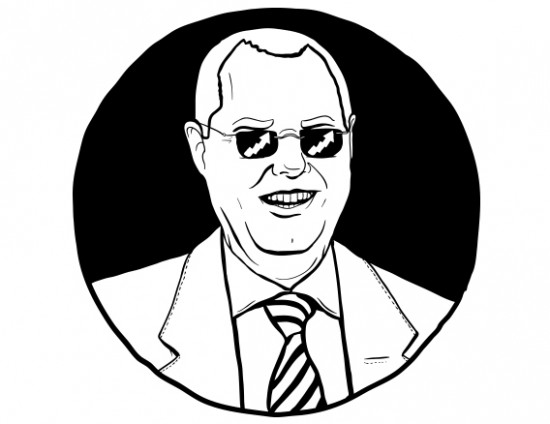
***
Merkel’s policies show a paralysing presentism
Claus Leggewie talks to Jakub Stańczyk on the German society’s state of mind before the coming election, the Chancellor in office, and the energy policy in a European dimension.
Jakub Stańczyk: The final outcome of the Bundestag election will no doubt be informed by the awareness and state of mind of the German society. How do you find this particular factor?
Claus Leggewie: Germany considers itself to be an island of felicity in the sea of crises. The Germans’ thoughts inhere in the present, and they are trying to protect themselves against possible threats of the future. They would willingly have the apparently well-tested team with them again. Next Sunday, they will vote the party which would sustain this illusion of blissfulness the best. They follow the beaten track, which, in a future, may cause us and Europe even greater problems compared to these we are facing at present.
Yet, many assess Germany’s situation in positive terms. Recently, publicity was made around the Federal Republic’s economy hitting the ground running after the crisis. The success is, apparently, owed to the long-term effect of Hartz’s reforms as well as to the politics handled by the Chancellor in a stable fashion.
Hartz’s reforms have not been as much of a success as they are considered to be. In fact, social inequalities have been exacerbated. Angela Merkel’s policies have, in turn, brought about no reforms which would ensure Europe a future. It would be something really new, if the Kanzlerin submited first of all a consistent programme for sustainable growth of the power industry, which would be agreed on the European forum. It would have a potential of being an impulse for development of southern Europe, in the first place. Meanwhile, what we encumber the future generations not only with an enormous debt but also, and primarily, the emissions of greenhouse gases, as if the tomorrow were non-existent. The presentism of such policy is paralysing.
But who, if not Angela Merkel? Which of Germany’s political parties do not create illusions but have instead a reliable agenda and a vision of the country’s future?
To say a ‘vision’ would be too farfetched. But if this election is followed by a Red-Green-Red coalition [i.e. composed of two Left parties, SPD and Die Linke, plus the Green Party (Editorial note)], we will probably see efforts made to reinstate and renew a welfare state. Also, a Black-Red coalition [composed of CDU, CSU and Green (Ed.)] could assume sustainable development of power industry as central to their policy. Please bear in mind that energy policy is not a marginal condition of development. The switch into renewable sources of energy enables to create a completely different and better economic and social model, one that emphasises the independence of local communities’ actions and allows an alternative lifestyle to develop as far as mobility, sustenance and land development planning are concerned. True, these notions appear in Mrs. Merkel’s rhetoric, but not in the real politics which is formed through legislation, technology development, and economic incentives. Changes of this kind would fastest be effected by a Black-Green coalition; however, according to polls, this is the option the Germans like the least.
You have mentioned earlier that an energy policy could prove helpful to Southern Europe. How important is the Energiewende [German power industry reforms, discussed at length in the issue titled ‘Liberty – Climate – Electricity’] for the future of European integration?
Most Europeans are just waiting to see Germany botch up the power sector issue, in which case everybody could behave like before, with no respect for the natural environment. The German Government is also responsible, for it has failed to coordinate a sustainable development of power sector in a pan-European dimension. Germany is not a ‘model’ for everyone to follow; still, for the European industrial, power, and infrastructural policy to be modified, would call for more extensive supranational cooperation than before. Within the European power network, the individual national strategies would enjoy considerable autonomy; first, however, such a network would have to be established, and its operational quality tested. Unfortunately, Europe is getting decomposed, one of the contributing factors being what in my view is the conservative and unregenerate nationalist obstruction inherent in London and in Warsaw.
First, the cabinet led by Donald Tusk is anything but nationalist. Second, Polish Prime Minister has made a number of gestures of friendship for Berlin. Thus, I should find your description of the Warsaw policy somewhat misleading.
I have no doubt about Mr. Tusk’s declared will to cooperate, and his Berlin orientation. More of an issue, however, is the polish right wing which wants to overthrow Tusk and the energy policy, climate policy, and environmental protection, where an anti-green consensus exists. What is it that the Polish Government is doing, in specific, for the World Climate Summit, due for this autumn in Warsaw, to be a successful outcome? To what extent is Poland ready to submit to discussion its coal and nuclear power policies? Please, do not understand me wrong, personally, I am a fan of Polish-German cooperation and a critic of polish conservatives (and communists), who are always against Europe. Still, as far as environment protection and energy policy, Poland seems unfortunately like a disincentive, against it‘s own interest.
Having said quite a lot of energy policy, what other issues do you consider critical to the ongoing political campaign? In her essay, published in today’s issue of Kultura Liberalna, Judy Dempsey finds that this year’s election campaign is as boring as it is because the problems it most frequently tackles are demographic and immigrant integration issues. It would be much more interesting, argues she, if it focused on security policy, military affairs, getting involved in the discussion on European drones, for instance.
These are important questions indeed. Europe is enclosing itself again, instead of proactively opening toward political refugees and immigrants looking for jobs, and creating a climate of favour. But election is election, and the question of who comes to power appears. The Opposition, without thinking much about it, adhere to a Red-Green coalition – although, in terms of arithmetic, this concept is completely unrealistic. There is no clearly formulated alternative solution for the present conservative-liberal stagnation. This issue is central, and crucial for rebuilding European influence across the world. The more lasting and solid workplaces a continent has to offer, the better the migration policy functions. A durable peace in the conflict zone can be only guaranteed by a mutual development. The proposal of Poland and Austria to bring CW warehouses in Syria under European control was a good impulse for an all-European peace and development policy.
* Claus Leggewie, German political scientist, head of the Kulturwissenschaftliches Institut Essen (Institute for Cultural Studies Essen).
** Jakub Stańczyk, member of „Kultura Liberalna” editors office.
*** Original text in German. Translated by EUROTRAD Wojciech Gilewski.
***
The Merkel Era and what next?
The almost certain electoral success of Angela Merkel in the elections to the Bundestag on September 22 will be a confirmation of the exceptional symbiosis binding the chancellor, who has been holding power for the last eight years, and the German society. Probably no German chancellor since the time of Willy Brandt had such a good understanding of social sentiment and none stood so well for the zeitgeist of the political époque.
It is customary in Germany to refer to the period of office of particular chancellors with the high-sounding notion of era, regardless of the calibre of their actual achievements. Today sociologists agree, that the mood for political change (Wechselstimmung) is not present in Germany. This means, that the public want the „Merkel era” to last. There are undoubtedly many reasons why such a wish is understandable. However, a great deal suggests that the Faustian desire for the moment to „stay, thou art so beautiful!” is based on the largely false conviction, that maintaining the status quo is the best guarantee for a bright future. In fact the “Merkel era” that has become synonymous with peace and prosperity by the Rhine and the Spree, particularly during the last four years, may well turn out to be no more than a transitional period between a decade of post-reunification turbulence and renunciation, and the necessity for Germany to make a significant switch in a few essential policy areas. A period, which leaves several open questions and unfinished business, instead of being a turning point that opens a new stage in the history of the Federal Republic.
The Teflon Lady
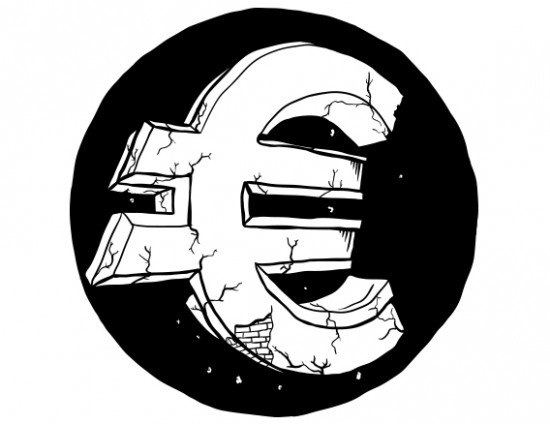
Merkel came into power in 2005, when most of these conflicts had been resolved. Schröder’s social reforms (change in the rules of citizenship, withdrawal from nuclear energy, equal rights for homosexual marriages) amounted to a political atonement for the liberalisation of the German society over the last few decades. Reforms of the labour market and the social security system (Agenda 2010) were a necessary, albeit painful adaptation of the German economic model to the new realities of the global economy. The heated debates on the participation of German soldiers in Kosovo, Iraq and Afghanistan eradicated more than one taboo, opening the way to a new, though volatile consensus on the question of the international involvement of Berlin. Fifteen years after the reunification, the East-West division of the country remained an important issue, but it was no longer in the foreground of the German political reality. From this perspective, Merkel took over the government of a nation more reconciled with itself than perhaps ever before, a nation expecting stability after a period of violent changes. Undoubtedly, the merit of chancellor Merkel (and the secret of her success) was that she responded to that expectation perfectly. Also, despite internal party resistance, she managed to modernise the conservative CDU, turning it into one of the pillars of the new social consensus (change of position on the role of women, energy policy, and family policy).
In recent years Merkel has not been the author of any groundbreaking reforms, perhaps with the exception of abolishing conscription and an about-turn in the area of the Energiewende (against the earlier decisions and under the pressure of public sentiment) [for more on Energiewende, see: https://kulturaliberalna.pl/2013/05/28/kemfert-jakobik-wisniewski-patocka-wolnosc-klimat-elektrycznosc/]. Still in grand coalition with the SPD (2005-2009), she skilfully averted a longer recession of the German economy during the crisis, by introducing economic stimulus packages and so called short-time working. Under her rule, Germany literally bloomed in the European crisis, taking advantage of the favourable economic constellation (low interest on bonds and competitive advantages). In European politics, Merkel responded to the public need to impose on the EU adherence to German principles (austerity, reforms), all the while diverging from them gradually and almost imperceptibly for the citizens – for the sake of EU and German interests. This “Merkiavellistic” (Ulrich Beck) policy paid off: thanks to the position of her government during the crisis, Merkel is breaking records of popularity in Germany, and the confidence towards the euro and the EU once again rose in the recent months.
The not-so-bright future
Merkel turned out to be the ideal politician, considering public expectation and the spirit of the times. Her swerving political style of avoiding conflicts and large scale plans may prove a heavy burden for the future. In reality the Merkelian era of peace and complacency, that Germans are so eager to rejoice in, is fuelled by numerous illusions. Germans enjoy listening to compliments concerning their economic model, but they forget about the deficits, that may cost them dearly in a none too distant future: weak education, underinvested public infrastructure and a shortage of qualified labour.
Today’s social peace is based on the so far good economic output, though its sustainability is by no means certain, for above stated reasons. There is no shortage of potential social tensions: material inequalities and blocked advancement opportunities for a large part of the population are perhaps the most visible cracks on the Rhenish model of capitalism. Merkel reassured the Germans by restoring their belief, that the return to the deutschmark would not be a good choice, yet she failed to prepare them for the costs of saving the common currency, which may soon seriously affect the German account (the new bail-out for Greece, and perhaps even a debt reduction for countries of southern Europe). During the time of Merkel the debate on Germany’s international involvement has regressed – this concerns not only the reluctance to participate in foreign armed interventions, but above all the lack of strategic reflexion on Germany’s role in the world in a situation when over the last ten years the expectations towards Germany dramatically increased, especially in Europe.
Contrary to appearances, Germany is facing a period of none too easy choices – independently of who takes office after September 22. In the course of the present campaign the opposition parties – the SPD and the Green Party – have dared to break the taboo and demanded tax raises for the most wealthy for the sake of public investment and reducing inequalities. There are more themes that require debating. However the parties of the current coalition (CDU/CSU and the FDP) prefer the policy of sedation („Germany is strong and should remain so”), whilst the opposition does not have sufficient power to convince the public that an alternative to the present policy is not only possible, but also necessary. If Angela Merkel does not run out of determination or luck, saving the euro will go down as the trademark of her “era”. It would be a considerable achievement. But the interest of the whole of Europe would be better served by a Germany that, after a reassuring decade of the “second economic miracle”, would gather the strength to face challenges, which will determine its condition in 10-15 years.
* Piotr Buras – Director of the Warsaw Office of the European Council on Foreign Relations (ECFR), www.ecfr.pl. In „Kultura Liberalna” we recently published his text „W społeczeństwie niemieckim gotuje się” (Things are Stirring up in German Society). The Warsaw ECFR Office is the programming partner of „Kultura Liberalna”.
** Original text in Polish. Translated by EUROTRAD Wojciech Gilewski.
***
A pedagogy of crisis
Today’s contradicting expectations from Germany and extreme opinions come as a confirmation of a special status of this country in Europe. The present German Kanzlerin reassures us about her pro-European instincts but also about her resolute defence of the German interests. Disappearance of the reason for which the decision to restructure the Euro Zone has been postponed, and reappearance of a tempestuous discussion on subsequent aid packages will be the major effects of Germany’s coming election.
From the Brussels perspective, the parliamentary election in the largest EU country due for September has gained a somewhat mythical importance. Everyone deposits their hopes in it: some, for the reforms to get unblocked and integration accelerated; others, for quitting certain overly ambitious projects. Whilst some would expect that a policy of excessive savings be replaced by one of growth, others would opt for a more profound consolidation. Hence, there is clearly no chance to make everybody happy in Europe once this election is over. Apparently, the Bundesrepublik’s election campaign tells us more about ourselves and our perplexities in the EU, rather than about Germany itself. The country stays relatively quiet, whilst EU-related subjects only surfaced there in the last phase of the campaign.
Debating under dictation of nerves
The year of the German election has exposed us to a temptation to explain everything Berlin is doing, or failing to do, in terms of ‘election tactics’. A lot of time has been spent on discovering the hidden agenda, the true intents, and speculating what is going to happen after 22nd September. The Germans have uttered their denials, but were not trusted. Thus, as the first positive effect of this election, an end will be put to this counterproductive dispute – the European debate hopefully re-centring on the merits.
This debate is going on under crisis circumstances, and to the accompaniment of rather common complaints about the ‘German dictate’. But even more disappointed we tend to be when seeing the Germans withdraw from their ‘leadership role’ in the EU: if they have most of the instruments at their disposal, they ought to render them more strongly involved in combating the crisis. Such contradictory expectations or extreme evaluations essentially confirm that Germany enjoys a special status in Europe today. Countries which are confronted withthe like responses are thereby told that they are treated as superpowers, regardless of whether they want it or not. The present German Chancellor reassures us about her pro-European instincts but also about her resolute defence of the German interests. The latter aspect is certainly stronger emphasised than under her Christian-Democratic predecessor Helmut Kohl, as the voters’ expectations are now different.
In the present crisis situation, the climate of talk about cooperation within the EU has also changed. Durable instruments to prevent trouble in the future have been developed; we now can do more than merely ‘extinguish the fires’: there has never been so much of a ‘Europe’. Yet, our mood is still not too good. The sense of shared fortunes and reciprocal dependencies, which essentially means closeness, has increased; it is, however, a cold closeness of Europeans who have more claims against one another than mutual trust, with their differing understanding of what (the) crisis is. ‘More of Europe’ would mean more money in aid packages, some would say; or, more control and financial discipline, as others would put it. The temptation has increased to look for solutions within a smaller group, without caring about the Union as a whole; splits have appeared about and between‘takers’ and ‘donors’, the North and the South, the Euro Zone and the remainder; national interests are recently expressed in a more, say, direct fashion. Whereas this would be comprehensible in itself, the divisions within the EU tend to get exacerbated, if not toxic, when not inveterate in a sense of community. The crisis antidote discussion is turning into a race for the right to exclusively interpret the reasons and to denounce those to blame. In the language of politicians, who by nature have to solicit diverse voters, these interpretations are reduced to simplified slogans. Since people find it hard to get it straight when tackling the objectively compound matter, with the EU having ceased to be an involuntarily accepted and positive point of reference, a sort of ‘spiritual homelessness’ may appear. An atmosphere is emerging where, for instance, tabloids in a country of the North greet the Minister of Finance in one South country with a headline reading, “Welcome to the country where people get up at six every day to work hard, and so on till they turn 67 of age!”. The response comes in the form of charges evoking World War 2. The spiral is going further and further down, with no end in sight.
The election puzzle
What is it that we can learn about the public mood of the German society in the context of this coming election? It seems that the society will go through a real endurance test much later, when Berlin is forced to accept the possible restructuring of the debts of the countries benefiting from aid programmes – that is, in terms of real expenditure, rather than credits only. At present, the voters are told Germany has profited on the crisis, for, providing a safe harbour for investors, the country is paying extremely low interest upon its debts. Populist sentiments are taken note of, but even though they might be stronger compared to what is visible with the unaided eye, the extremist parties will take no essential part in this election.
From the Brussels perspective, more interesting seem the effects for Germany of a certain evolution of the ‘pedagogy of crisis’ – namely, liberal into social. In line with the former, which is closer to Berlin’s concepts, pressure of the markets is the only factor capable of making politicians reform; without structural reforms, trust from the markets will not be regained. For several months now, however, criticism of the policy of cuts and debt reduction as the basic criteria has been strengthening. There is more understanding now for growth-stimulating actions. Although the dispute is more focused on communication than reality (any politics must merge these two elements), it has animated a discussion on the European social model which has always formed a dam against populist movements, while being an important source of democratic legitimacy. The European leaders, subject today to the EU-imposed rigours of savings policies, feel deprived, all of a sudden, of their own instruments with which to build the dam and stabilise the democracy. Taking the opportunity, they have reproached Germany for setting its hand to undermine the social model in Europe through maintaining low salaries and flooding Europe with cheap commodities. Berlin is astonished – as much as it considers its reforms and the cooperative model of employer-employee relations a historical success.
In spite of their spectacular disputes around what needs being emphasised in the economic policy, Germany’s chief political forces stand in most cases on equal footing. Regardless of whether the Christian Democrats will form a coalition with the Liberals or Social Democrats, to point out to the two most plausible options, Chancellor Merkel will not markedly deviate from the present ‘consolidation-oriented’ track. Hence, the major effect of the election will be disappearance of the reason for which the decision to restructure the Euro Zone has been postponed, and reappearance of a tempestuous discussion on subsequent aid packages.
* Marek Prawda ispermanent representative of Polandto the European Union, at the EU Council.
** Original text in Polish. Translated by EUROTRAD Wojciech Gilewski.
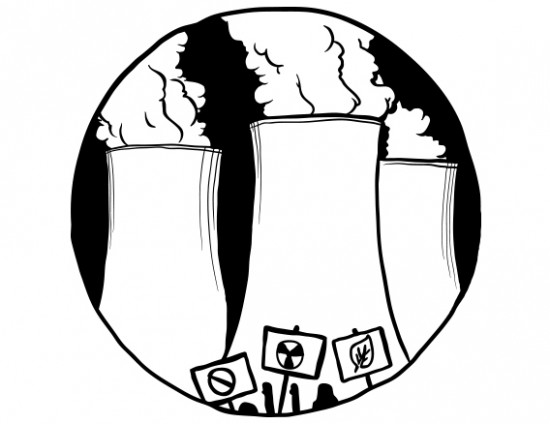
***
Finance and remembrance
When the financial crisis arrived on the Old Continent from the United States, it turned out that Berlin was the only capital that managed best to cope with it and that it slowly began to take over the initiative in the EU. Germany’s growing domination conjured up the ghosts of the past. There is nothing more convincing than the current crisis that economic policy must be accompanied by a more efficient policy of remembrance.
When the world leaders were buttoning up before they set out for their trip to the G-20 summit in Petersburg, Joachim Gauck and François Hollande went in an opposite direction. The presidents met in Oradour-sur-Glane which is not well known outside France. In 1944, the German army, resorting to methods which were rather prevalent on the eastern front, murdered nearly all its residents. After the war, General Charles De Gaulle made a decision not to rebuild the destroyed Oradour-sur-Glane leaving it as it was in memory of the massacre victims (642 people). Today one may still see the skeletons of the 1930s cars that had been burnt down, and have a bird’s eye view of the burnt-down interiors of buildings.
For all our troubles – Germany
When the financial crisis arrived on the Old Continent from the United States and it turned out that Berlin was the only capital that managed best to cope with it, and what is more, that it slowly began to take over the initiative in the EU, strong anti-German sentiments began to take the upper hand in almost entire Europe. As if against widespread laments about the declining standards of school education about the past and excess of political reconciliation gestures, the economic crisis forces us to look at that problem from a different perspective.
Firstly, Germany has become a distorting mirror of reform failures experienced by many EU states. Nearly all over Europe the economists began to recall the reforms of Schroeder’s government of several years back and continue until today to factorize the assumptions underlying the „Hartz” program and its implementation. More flexible forms of employment combined with lower taxes imposed on the richest – in the comments about Germany one could hear a new tone of fascination with the „German economic miracle”, as if it were the second opening of Wirtschaftswunder. But what conclusions have been drawn by experts? It seems that „Analysis”, a BBC radio program, is representative in that context, because after a comprehensive analysis of the German work culture a conclusion was drawn that it was not directly applicable in Great Britain. It was also added by way of a consolation that the situation in the UK is not that bad. After all Oxford and Cambridge continue to stand ahead of German universities in the rankings. So much for an illuminating conclusion.
Populism and ghosts of the past
Secondly, Germany’s growing domination conjured up the ghosts of the past. One may sometimes get an impression that to some EU citizens all reconciliation gestures between the peoples of Europe have become meaningless. It is understandable that the current crisis was compared in the whole Europe to that of the 1930s and to its atmosphere. But along with the crisis of the Euro zone and financial difficulties faced by individual states the wave of anti-German sentiments began to rise. One may ignore the flurry of caricatures and memes on the Internet as practically unimportant. So as various xenophobic slogans during street protests in southern Europe which could be viewed as pathetic episodes in the vein of infamous speech in the European Parliament that Silvio Berlusconi addressed to Martin Schulz. But the situation is different when similar arguments are voiced these days by the politicians of the mainstream political scene turning them into an element of the debate about European affairs. The way a prominent left wing politician and minister of the current French government, Arnaud Montebourg, did (on 1 December 2011) when comparing in public Angela Merkel’s policy to that of Bismarck’s at the time he had been struggling for a dominant position in Europe. In recent months one may have come across similar examples in Eastern Europe. At the time of the last presidential election in the Czech Republic concerns were voiced that Karel Schwarzenberg was perhaps too German to represent his country. No wonder then that recently „The Economist” displayed on its cover the German eagle bashfully hiding its beak behind a wing. The special report’s title– „The Reluctant Hegemon” – was self-explanatory.
***
The foregoing is happening at the time when German politics are represented by people who had once lived in communism. It is paradoxical that the odium falls on the heads of people who had personally experienced History. Chancellor Angela Merkel lived nearly 35 years in the GDR and according to her biographers the Prague Spring rather than Paris barricades was her 1968. And Joachim Gauck became a symbol of an honest squaring of accounts with communism. Their experience is closer to the experience of those who remember the countries of peoples democracy with their absence of freedom of speech, secret service and the policy of shortages. As Timothy Garton Ash has recently observed it is here that there are still the springs of great enthusiasm for the European project – the enthusiasm which is so hard to find in Western Europe (with Great Britain as a meaningful example).
It is therefore not accidental that people like Gauck appreciate the meaning of the past for present day politics and make gestures like the one he made in Oradour-sur-Glane. There is nothing more convincing than the current crisis that economic policy must be accompanied by a more efficient policy of remembrance. One cannot rely any longer on historical ignorance of the prospective generations of Europeans.
* Jarosław Kuisz, editor in chief of „Kultura Liberalna”.
** Original text in Polish. Translated by EUROTRAD Wojciech Gilewski.
***
Pre-election Crosstalk
To what extent does this year’s campaign tell us something about our neighbor’s political class and society?The home stretch of the pre-election season began with a TV debate between the incumbent chancellor, AngelaMerkel,and her social democratic rival,PeerSteinbrück. The duel broadcast live during Sunday’s prime time by four German TV stations was to present the opposition Social Democratic Party of Germany (SPD)with an opportunity to rise in opinion polls.Both the moderation manner and the choice of journalists conducting the debate suggested an intension to allude to a lively and aggressive American style. But the politicians turned out to be impervious and the debate was „as usual”:serious and competent, devoid of charisma and panache. Such controversial subjects as the NSA scandal or intervention in Syria were given minimal time.
That is why, perhaps, an unquestionable winner that evening was … the necklace in the national colors of Germanywhich, owing to the cameras, decorously presented itself on the Chancellor’s neck for 90 minutes. There was an immediate response on Twitter with the number of comments in excess of several thousands. People wondered if Madam Chancellor was perhaps representing a covert Belgian element as that country’s national colors are the same.
TV debates are a short-established tradition in Germany.They are nowhere near the great American media events such as the acclaimed 1960 confrontation between the giants, Vice-President Richard Nixon and Senator JohnF. Kennedy. The TV Merkel-Steinbrückduel was the fourth one in the history of German democracy. In 2002 Edmund Stoiber, Bavaria’s prime minister, was the first to “throw down the gauntlet„in front of TV cameras to the incumbent Chancellor Gerhard Schröder. In the following campaigns the voters’ emotions ran high during the Schröder-Merkel and Merkel–Steinmeier debates. That is why Madam Chancellor may be viewed as the veteran of that media format.
It was a prevalent opinion that the debate did not give any of the partiesan unequivocal advantage and that its atmosphere was lukewarm. The PolitBarometerbroadcast by ZDF a few days after the last debate confirmed that voters’ preferences were not affected by that event. The CDU continued to enjoy a support of 41 percent and the SDP remained with its 26 percent.
Once in a blue moon and everyday politics
The commentators agreed about one thing: the debate may have not produced benefits to any of the parties, but it was undoubtedly favor done to democracy and civil society. The broadcast was watched by nearly 18 million viewers and made the Internet usershighly active. The German media, public institutions and nongovernmental organizations use the final weeks preceding an election to mobilize those who are still undecided or are to vote for the first time. It follows from a recent opinion poll that on September 22 the constitutional right may not be exercised by nearly one third of German citizens who have the right to vote. The nonpublic media, SAT 1 and PRO7, have launched a social campaign under a motto: „Gehwählen!”(Go to vote!).Public TV has been broadcasting series of feature programs andquizzes about democracy which owing to their attractive and intelligent form should be appealing to a young viewer. This year’s billboard campaigns are exceptionally restrained. It is likely that party spin doctors noticed that the society, which has been attacked by contradictory and aggressive messages during the Euro zone crisis, is tired.And hence, perhaps –contrary toall expectations –its marginalinterest in the Alternativefür Deutschland. In this campaign –as it is evident –the subject of Euro will not call for radical choices.
The parliament remains an everyday platform of political bickering. It was best evidenced on September 3 by a stormy debate, or rather a genuine verbal battle,in the Bundestag at the time of the last parliamentary session before the election. Chancellor Merkel had to stand up toan accusation that she had underachieved in running the country. It was a day when the opposition squared the accounts with the government and engaged in a heated debate with a view to mobilizing its own electorate. The temperature of that debate may only rise before the election.
Safe dispute limits
Apart from the typical political institutions – both the traditional and modern ones –the sphere of culture is an important area of the exchange of views and disputein Germany. Suffice it to mention the acclaimed documentain Kassel or the Berlin Biennial. The one in 2012, where ArturŻmijewski was a curator, awoke the German public’s thirst for everything that is controversial, political and committed, along with a parallel need to go deeper into the subject matter instead of sliding across the surface, thus slipping into clichés. Berlinale, the International Film Festival, is famous for its affection for committed films. It is there that small productions stand the highest chance of being noticed and appreciated. If not by the jurors then by the demanding public. It should be noted that in Germany culture is not for elites and it has not been commercialized the way it happened in many EU countries.Cultural institutions operate not only in major urban centers but also in small towns.
Naturally, the contact only with art or literature, whose „commitment is exposed” (to quote from JacekDehnel),would be hard to bear, but it creates a natural space for many views, for their resounding and rationalization. Therefore there are forms of behavior, tools of an open and safe interaction with people.
It was Josef Beuys whocreated election posters for the „Green”in 1980. In this year’s campaign the esthetic standards seem to be „slightly” lower. For their advertising spots both the NPD (the National Democratic Party of Germany) and the FDP (Free Democratic Party)purchased on the Internetthe same concept which had earlier been successfully used in the Finnish commercial of yoghurt…
The German institutions are valuable not only because they exist, but also because they are flexible and capable of self verification. Would the society that has been presented with such an offer by the state be willing to overturn them? I do not think so. Which by no means deprives it of its right to greater emancipation. The right to demand from the political class to forsake worn-out formulae, to publicize its recipes for the future in an attractive and also convincing way. A publicist said that today’s German voters are as unpredictable as the April weather. The reality we live in is the same. It is more difficult to be infallible and it is dangerous to voice irrefutable truths. Politicians are aware of that permanent variable and changeability, so as the voters. So what are we left with? It is again time to pass the maturity exam.
* Małgorzata Ławrowska, head of the Foundation of Polish-German Cooperation.
** Original text in Polish. Translated by EUROTRAD Wojciech Gilewski.
***
* Authors of this issue’s concept: Małgorzata Ławrowska and Karolina Wigura.
** Cooperation: Kacper Szulecki, Jakub Stańczyk, Hubert Czyżewski, Emilia Kaczmarek.
*** Project coordination at „Kultura Liberalna”: Ewa Serzysko.
**** Coordinator at the Foundation of Polish-German Cooperation: Magdalena Przedmojska.
***** Illustrations by: Krzysztof Niemyski.
„Kultura Liberalna” issue no 245 of 17th September 2013
